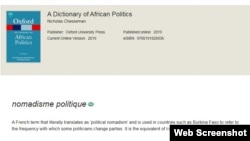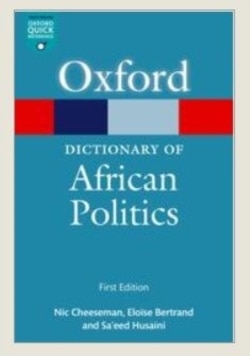Up and down the continent, African politics sees more than its share of chaos and corruption. Africans use colorful terms and phrases to describe the unfolding developments and, sometimes, make fun of them. A new online Dictionary of African Politics, published by Oxford University Press, tries to define these words.
In Nigeria, for instance, the term “zoning” has nothing to do with buildings or real estate. It describes power sharing between the north and south.
In Kenya, a “three-piece suit” refers to a party asking voters to back its full slate of candidates, for president, governor and member of parliament.
Oxford student Sa'eed Husaini, one of the dictionary’s authors, said he and his colleagues thought the project would “give us an opportunity to basically shine a light on the diversity of words and diversity of meanings that are part of African politics. … There is a lot of meaning that is being generated, a lot of new content words, like ‘stomach infrastructure,’ that “will help us understand how Africa conducts contemporary politics."
The term "stomach infrastructure" was coined by a politician in the 2015 elections in Nigeria. He promised people rice and chicken over development and won that election.
In Benin, switching of parties by politicians is called “transhumance,” which is the act of moving animals from one grazing ground to another.
In Ghana, supporting the president of one party and a member of parliament from another party is called “skirt and blouse” voting.
Another Kenyan term is "negotiated democracy," which means the arranged sharing of power between communities BEFORE an election takes place.
Kimani Njogu, an African linguist, said people create and use such terms everywhere, acts of what he called "semantic expansion."
"It brings in a certain playfulness in our politics, certain humor, ingenuity, relaxation of atmosphere, normalization of the politics, so that it's not seen to be too removed from the day-to-day experiences of people," Njogu said.
Former Kenyan Prime Minister Raila Odinga has seen this type of language throughout his long career.
"It's not that they are being simplistic about complex issues,” Odinga said. “It's just that they want to make it light. Sometimes you should crack a joke about those issues, but I think it's a way of expression that in one hand tells you it’s not right, but also with a light touch. I think that's part of the African culture."
The Oxford dictionary covers 350 words commonly used in Africa since the introduction of multiparty democracy more than three decades ago.
Njogu said the dictionary would change over time, as old expressions lose their usefulness and people create new ones to comment on their politics.





